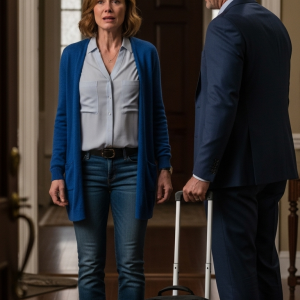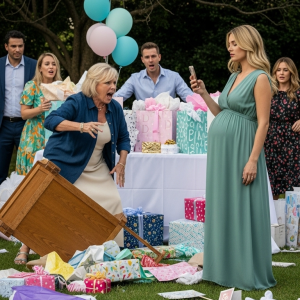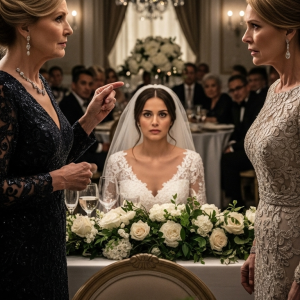The Martin residence was not a home; it was a statement. A minimalist masterpiece of glass, concrete, and soaring white walls nestled in the hills of Beverly Hills, it was a testament to the success of its sole owner, Helen Martin. A celebrated architect, Helen had designed the house herself, crafting a space of clean lines and quiet elegance. But within its perfect, sun-drenched walls, a deep and ugly rot had taken hold.
Her children, Leo, 21, and Chloe, 19, were the living embodiments of this decay. They were beautiful, polished, and utterly hollow. Raised in a world where everything was provided, they understood the cost of nothing and the value only of what could be flaunted on social media. Their reality was a curated feed of their friends’ yachts, private jets, and designer wardrobes, a constant stream of envy that fueled their bottomless sense of entitlement.
Helen, a single mother who had built her empire from scratch, saw the abyss between her work ethic and their indolence. She tried to bridge it. She’d sit them down at the massive marble island in the kitchen, attempting to talk about summer jobs, about responsibility, about a life beyond their trust funds.
“This isn’t real life, you know,” she told them one evening, her voice laced with a weariness that went bone-deep. “The money I make, this house… it’s the result of work. Hard work. You need to start building something for yourselves.”
Chloe had rolled her eyes, not even looking up from her phone. “Oh my god, Mom, don’t start. You’re so old-fashioned. We’re not going to go flip burgers.” Leo just smirked, seeing his mother’s concern as a lecture, a tedious background noise to his much more important life. To them, her wealth wasn’t an achievement to be respected; it was a resource to be consumed.
The signs of their escalating detachment were everywhere. A few weeks prior, Helen had a state-of-the-art security system installed. When she explained the discreet, pinhole-sized cameras in the main living areas, she told them it was a precaution against break-ins. They barely registered her words, never once imagining the system was not to keep strangers out, but to watch the enemies within.
Their complaints were a constant refrain. Lounging by the infinity pool that overlooked the hazy expanse of Los Angeles, they’d scroll through Instagram, their faces masks of discontent. “Ugh, Tiffany is in Monaco again,” Chloe would whine. “Why are you so stingy, Mom? It’s embarrassing.”
Leo’s resentment was more ambitious. He had recently tried to pitch Helen on a vague, nonsensical cryptocurrency “project” that promised absurd returns. Helen, a woman who dealt in blueprints and physics, had asked for a business plan. For numbers. For a single shred of tangible reality.
“This is a joke, Leo,” she had said, pushing his scribbled notes back across the table. “This isn’t an investment; it’s a fantasy.” His face had hardened with a fury that startled her. He saw her prudence not as wisdom, but as a personal betrayal, a refusal to fund the effortless, glamorous life he felt he was owed.
The act itself was a violation performed with surgical precision. It happened late on a Tuesday night. The house was still, the only light coming from the moon casting long shadows across the polished concrete floors. The security camera in the living room, a silent, unblinking eye, recorded it all.
Leo and Chloe crept down the grand, floating staircase, their movements practiced and conspiratorial. They were ghosts in their own home, moving toward Helen’s purse, which sat on the console table by the door. There was no hesitation. Leo’s hand, steady and sure, slipped inside. He carefully, gently, slid the black, high-limit credit card from its slot in her wallet, taking care not to disturb anything else.
He held it up for Chloe to see. They didn’t speak. They didn’t need to. They shared a slow, triumphant smile, a flash of shared victory in the dim light, and sealed their crime with a silent, deliberate high-five. Then they slipped back up the stairs, the card—the key to their desires—clutched in Leo’s hand.
The next day, Helen was in the middle of a tense negotiation for a new museum project when her phone vibrated on the conference table. A text message from her credit card company. Transaction Alert: a single purchase for $15,280.00 at a high-fashion boutique on Rodeo Drive.
A cold dread washed over her, a feeling so certain and so sickening it almost took her breath away. She excused herself from the meeting, her face a calm, professional mask that betrayed none of the turmoil within. In the quiet of the hallway, she opened her purse. She ran her thumb over the slots in her wallet. The familiar, smooth rectangle of her primary card was gone.
A few hours later, an automated email arrived. Subject: Your Recent Service Request. It informed her that a request to report the card as lost had been successfully processed online and a new card was being mailed. The pieces clicked into place with horrifying clarity. They had taken it. They had used it. And they had reported it lost to cover their tracks. They thought they were clever. They thought she was a fool.
That evening, they came home empty-handed, having stashed their purchases in the trunks of their cars. They sauntered into the kitchen where Helen was preparing a salad, their faces studies in casual innocence. “Hey, Mom,” Chloe said, grabbing a bottle of water from the fridge. “What’s for dinner?”
The sheer, breathtaking normalcy of the question was a physical blow. They had stolen from her, lied, and then came home to ask for dinner, to be cared for, to be mothered. In that moment, watching them, Helen felt a part of her heart, the soft, forgiving, maternal part, begin to harden into something cold and unbreakable.
Later that night, alone in the blue glow of her office monitors, she watched the security footage. She saw it all: the stealthy descent, the deft theft, the victorious high-five. She watched it once, then twice, then a third time. Their faces, illuminated by the screen, were not those of children who had made a silly mistake. They were the faces of calculating criminals, smug in their success.
Her own face, reflected in the dark screen, was a mask of grief and resolve. This was not a teachable moment for a family talk. This was a line that had been crossed, a fundamental betrayal that words could no longer fix. Love had failed. Lectures had failed. Now, only consequences remained.
She picked up her phone and dialed the number for the credit card’s fraud and security department. Her voice, when she spoke, was perfectly level, devoid of any emotion.
“Hello,” she said. “I need to report a stolen credit card.” There was a pause as the agent on the other end began the standard script. Helen cut him off. “Let me be clear. My card was not lost. It was stolen. I wish to press charges, and I am requesting a full criminal investigation.”
Three days passed in a state of surreal, tense silence. Leo and Chloe went about their lives with an air of untouchable self-satisfaction. They brought their new acquisitions in from their cars—outrageously expensive sneakers for him, a ridiculously priced handbag for her—and spent an afternoon by the pool, staging photoshoots for their Instagram followers.
They posed and pouted, tagging the brands, crafting captions about being “blessed.” They truly believed they had executed the perfect crime, that the reported “lost” card was a dead end, a minor inconvenience for their mother that would be forgotten in a day or two. They were completely, blissfully, arrogantly unaware that they were living on borrowed time.
The illusion shattered at 4:15 PM on a sun-drenched Friday.
The doorbell chimed, its pleasant, melodic tone a stark contrast to the grim reality it announced. Leo, annoyed at the interruption, answered it. On the pristine white marble of their entryway stood two uniformed police officers from the Beverly Hills Police Department. Their faces were impassive, their presence an immediate and shocking intrusion into the family’s hermetically sealed world of privilege.
“We’re looking for Leo and Chloe Martin,” the senior officer said, his voice a flat, official baritone that held no room for negotiation.
Leo’s smug demeanor evaporated, replaced by a flicker of confusion. “That’s us. What’s this about?”
“We have a warrant for your arrest,” the officer continued, holding up the document. “On suspicion of grand theft and credit card fraud.”
The blood drained from Leo’s face. Chloe, who had come to the door, let out a small, strangled gasp. Their eyes darted past the officers, searching for their mother, the person who always fixed everything.
They saw her. Helen was standing at the far end of the long hallway, by the entrance to her office. She was simply watching. Her face was a heartbreaking canvas of pain and unyielding resolve. She did not move. She did not speak. She did not rush forward to defend them. She was a silent judge, allowing the sentence she had put in motion to be carried out.
Their last, desperate hope vanished. This wasn’t a mistake. This was happening.
“You have the right to remain silent,” the second officer began, the words of the Miranda warning sounding utterly alien in the context of their sunlit, art-filled home. “Anything you say can and will be used against you in a court of law…”
The click of the handcuffs locking around Leo’s wrists, then Chloe’s, was a deafening sound. They were escorted out, their heads bowed in disbelief and shame. The walk of shame was a brutal tableau of contrasts: two wealthy, beautiful young adults in designer swimwear, handcuffed and being led by police past their own infinity pool, through their own perfectly manicured garden, and into the back of a waiting squad car. Their flawless world had just been publicly and violently fractured.
The first phone call from the Beverly Hills police station came two hours later. It was their one allotted call. Helen sat in her silent office, the phone in her hand, and answered on the first ring. She knew it was coming.
Leo was on the other end. His voice, usually so confident and dismissive, was now a raw, panicked thing, cracking with rage and fear. “Mom! What did you do? What the hell is going on? You have to get us out of here! You have to call a lawyer and post bail right now!” He wasn’t asking; he was demanding, still operating under the lifelong assumption that she was his personal concierge for any and all problems.
Helen closed her eyes, gathering her strength. This was the hardest moment. The moment to sever the cord of enablement for good. Her voice, when she spoke, was quiet, but it carried the immense weight of her decision. It was as cold and hard as iron.
“No, Leo,” she said.
The silence on the other end of the line was thick with shock.
“This wasn’t a mistake you made,” she continued, her words precise and measured. “This was a crime. You are adults. These are not my consequences to fix; they are yours to face. This isn’t a game. This is the real world. You will have to use your own money to find a lawyer. I will not be posting your bail.”
“You can’t do this to us!” he screamed, his voice turning into a desperate, childish wail. “We’re your children!”
“Yes, you are,” she said, and for the first time, a tremor of her own immense pain entered her voice. “And this is the last thing I can do for you.”
She hung up the phone. The click was a sound of finality, of a door being locked and a bridge being burned. She sat in the darkness, the tears she had held back for days finally streaming down her face. She was a mother, and she had just handed her children over to the wolves, praying it was the only way to save them from themselves.
Left on their own, Leo and Chloe were forced to navigate the terrifying, bureaucratic maze of the legal system. They scraped together money from their trust funds to hire a public defender who treated them not as special children of privilege, but as just two more names on a long and dreary docket. They spent a night in jail, a brutal, humbling experience that stripped them of every last shred of their arrogance. They were facing felony charges, a reality that could ruin the rest of their lives.
The courtroom, three months later, was a cold and impersonal place. Leo and Chloe were almost unrecognizable. The Beverly Hills tan had faded, replaced by a pale, gaunt look. They were thinner, their eyes wide with a fear that was no longer abstract. Their designer clothes had been replaced by ill-fitting suits they had bought at a department store.
They accepted the plea bargain their lawyer had arranged: their charges would be reduced from a felony to a misdemeanor, but only if they pleaded guilty. The sentence was two years of probation, 500 hours of mandatory community service, and full financial restitution for the $15,280, a debt they would have to repay themselves.
Helen sat in the very back row of the courtroom, a solitary figure in the near-empty gallery. She watched the proceedings without expression, a silent witness to the painful, necessary lesson unfolding before her.
The months that followed were a harsh education. Leo, who had once dreamed of being a crypto millionaire, found himself working as a barista, waking up at 4:30 AM to steam milk and clean espresso machines for minimum wage. Chloe, who had once sneered at anyone not wearing the latest runway fashion, got a job stocking shelves at a grocery store, the uniform a drab polyester vest.
They were exhausted, humbled, and for the first time in their lives, they were accountable. The money they earned, which felt like so little compared to the sums they used to waste, went directly to the court-ordered restitution fund.
One evening, after a long shift, Chloe sent a text to her mother. Three simple words. “I am sorry.” A minute later, a text came from Leo. “We’re sorry, Mom.”
Helen was in her perfect house, sitting by the window overlooking the city lights. She read their messages, her thumb hovering over the screen. She didn’t reply, not yet. A single tear traced a path down her cheek. It was not a tear of sadness, nor of victory. It was a tear for the brutal, painful cost of love.
Their relationship was shattered, perhaps irreparably. But in the rubble, something new and fragile had a chance to grow. For the first time, their apologies were not manipulations to get something they wanted. They were the first, tentative steps on a long road back to a reality they had never known, a foundation built not on money or privilege, but on the hard-earned respect that only consequences can teach.




